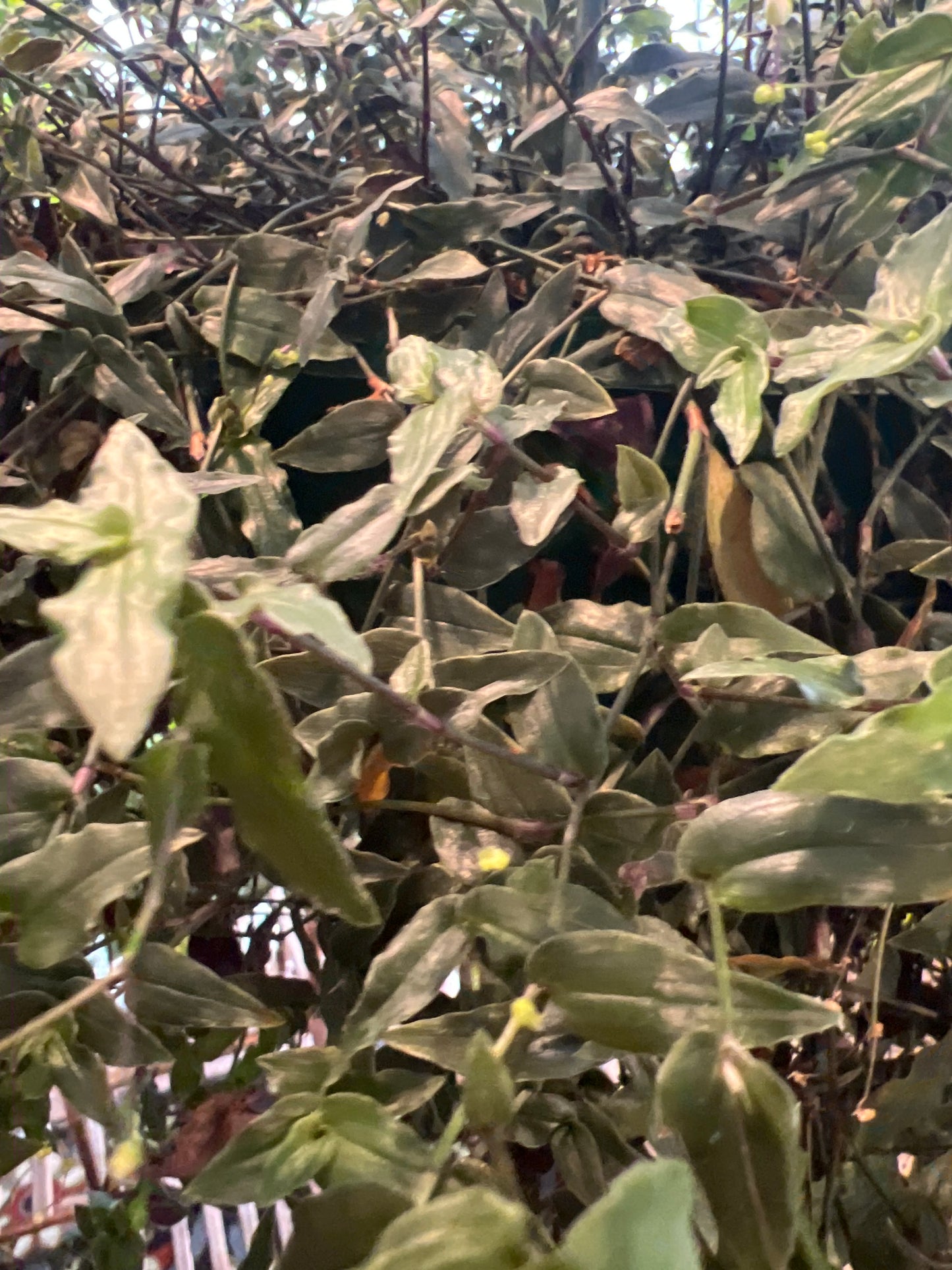Gibasis geniculata 'Bridal Veil'
Gibasis geniculata 'Bridal Veil'
Gibasis geniculata 'Bridal Veil'
Plant Description
Gibasis geniculata, commonly known as Bridal Veil, is a delicate trailing plant with slender stems, small lance-shaped green leaves with a purplish underside, and an abundance of tiny white, three-petaled flowers. This fast-growing plant has a graceful, cascading habit, making it a popular choice for hanging baskets and containers. Bridal Veil is related to the Tradescantia (Wandering Jew) family and is prized for its airy, elegant appearance and ease of care.
Native Range
Native to Mexico, Central America, and parts of South America, where it grows in warm, tropical regions.
USDA Hardiness Zones
Zones: 9–11 (Can be grown as an annual or houseplant in cooler climates)
Size
Height: 6–12 inches tall
Width: 2–4 feet wide (trailing growth habit)
Light Requirements
Prefers bright, indirect light to partial shade. Can tolerate some direct morning sun, but too much strong sunlight may scorch the leaves. In lower light, growth may become leggy, and flowering will be reduced.
Soil Requirements
Well-draining, rich, organic soil with good moisture retention. A mix of peat moss, perlite, and standard potting soil is ideal. Prefers slightly acidic to neutral pH (6.0–7.0).
Watering Needs
Keep soil evenly moist but not soggy. Water when the top inch of soil feels dry. Avoid overwatering, as this can lead to root rot. If growing indoors, use filtered water to prevent leaf spotting from tap water minerals.
Humidity & Temperature
Prefers warm temperatures between 65–80°F (18–27°C). Sensitive to cold and should not be exposed to temperatures below 50°F (10°C).
Enjoys high humidity. If growing indoors, misting or using a humidifier can help maintain the right moisture level.
Fertilization
Feed with a diluted balanced liquid fertilizer (10-10-10) every 2–4 weeks during the growing season (spring to early fall). Reduce feeding in winter.
Propagation
Easily propagated by stem cuttings in water or soil. Cut a 3–4 inch stem section, remove lower leaves, and place in moist soil or a water-filled jar until roots develop.
Uses
Hanging Baskets & Containers: Beautiful cascading effect with delicate white flowers.
Ground Cover (Warm Climates): Can be used as a spreading ground cover in shaded garden areas.
Indoor Houseplant: Thrives in bright indoor spaces with proper humidity.
Terrariums & Greenhouses: Ideal for enclosed humid environments.
Pest & Disease Management
Watch for spider mites, aphids, and mealybugs—treat with neem oil or insecticidal soap if needed.
Root rot can occur if soil remains too wet—ensure proper drainage.
Browning leaf tips may indicate low humidity or exposure to fluoride in tap water—use distilled or rainwater if necessary.
---SHIPPING NOTICE PLEASE READ BEFORE PURCHASING LIVE PLANTS!---
We WILL NOT refund the purchase of or the shipping cost of live plants purchased with the intent to be shipped to states that do not authorize importing live plants or to states with restrictions! Purchases to these states will be held for 30 days for pick-up at our Slidell, Louisiana store and the shipping cost associated with these purchases will be held for the care of the plant while waiting to be picked up. All sales are final. If the plant(s) purchased are not picked up within 30 days from the date of order, these items will be returned to our sales inventory and you WILL NOT be refunded. Thank you for understanding these policies.
Due to regulations, certain states have restrictions on importing plants. Please review the list below to ensure you're not attempting to order any restricted plants in your area.
**Important Note:** We do not ship any plants outside the U.S.
State-Specific Restrictions - We ARE NOT responsible for any plant(s) that are not listed in these restrictions. Purchaser bears all responsibility for making sure the plant(s) they desire to purchase are not banned from being imported to the shipping state:
Arizona: Juglans spp.
California: Castanea spp., Juglans spp., Pinus spp., Quercus spp.
Colorado: Some counties restrict Prunus spp. Please verify your local county regulations.
Florida: Castanea spp., Cornus spp., Quercus spp., Cornus mas
Georgia: Vaccinium spp.
Hawaii: Pinus spp.
Idaho: Humulus lupulus, Mentha spp., Vitis spp.
Indiana: Fragraria spp., Rosa spp.
Kansas: Juglans spp.
Michigan: Abies spp., Vaccinium spp.
Montana: Pinus spp.
Nevada: Allium spp.
Mentha spp.
New Jersey: Rosa spp.
New York: Vitis spp.
Oregon: Allium spp., Castanea spp., Corylus spp., Humulus lupulus, Quercus spp., Sambucus nigra, Ulmus spp., Vaccinium spp., Vitis spp.
Texas: Juglans spp.
Washington: Allium spp., Castanea spp., Corylus spp., Humulus lupulus, Vaccinium spp., Vitis spp.
Wisconsin: Abies spp., Pinus spp., Picea spp., Mentha spp.
Additionally, we cannot ship plants in soil medium to the following states: AK, AL, AR, AZ, CA, HI, ID, KS, MS, MT, ND, NM, NV, OK, OR, SD, TX, UT, WA.
Couldn't load pickup availability


